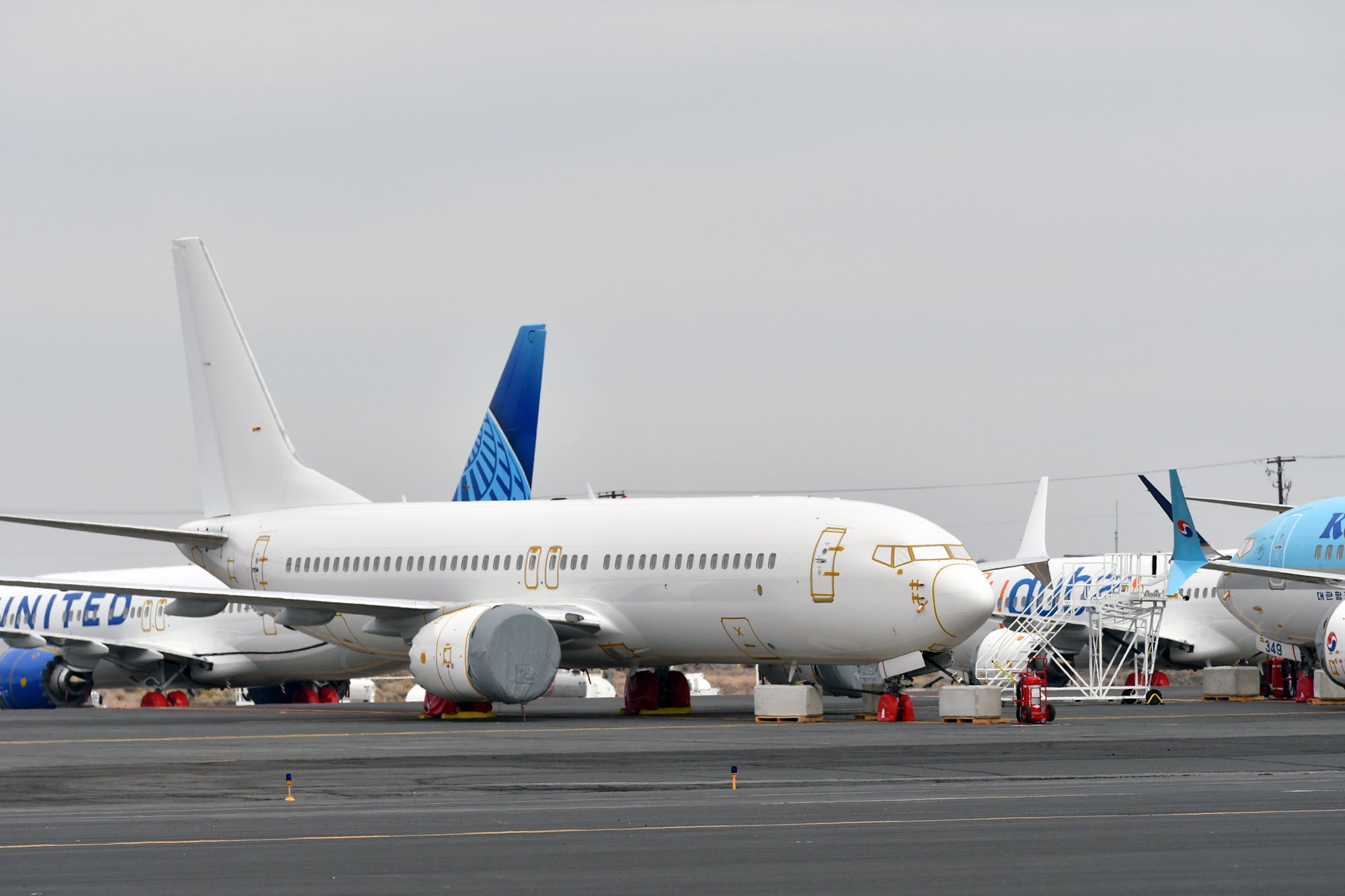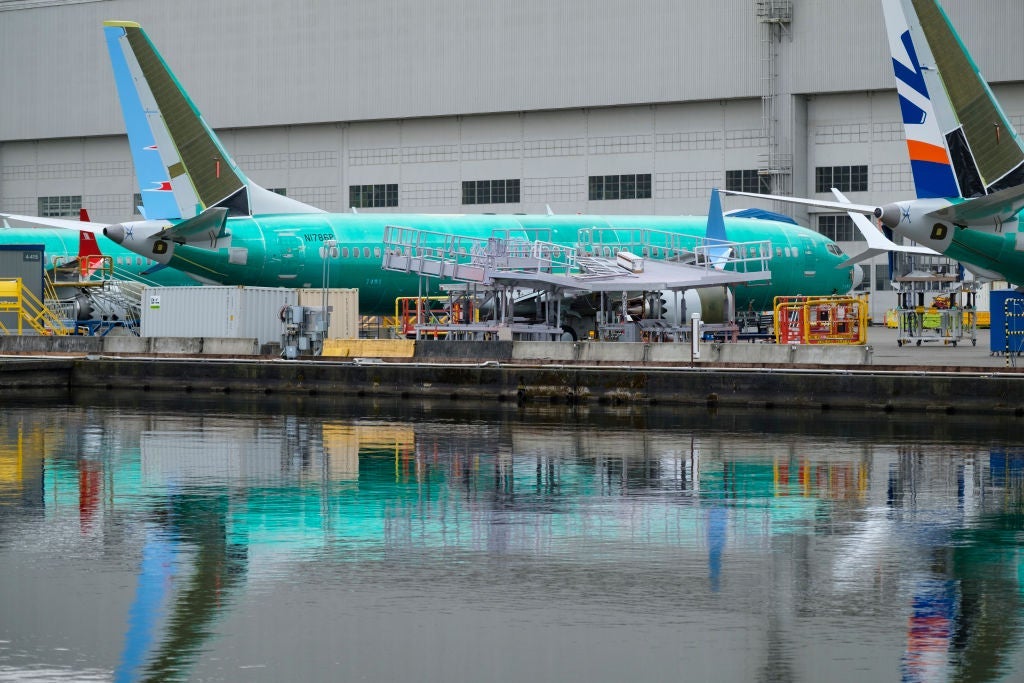Will airlines rebrand the 737 MAX if Boeing does not?
When one of your major customers speaks, you listen. And for Boeing, that happened on Monday.
"We've asked Boeing to get rid of that word MAX. There's no reason why Boeing can't call it a 737-8, 737-9, 737-7."
So said Steven Udvar-Házy, the chairman and founder of Air Lease Corporation, in remarks on Monday at the Airline Economics Growth Frontiers conference in Dublin. The billionaire (three times over) pioneered the aircraft leasing industry. Air Lease Corporation owns hundreds of aircraft from most major planemakers, and leases them out to airlines everywhere.
The firm, publicly traded on the New York Stock Exchange, owns more than 100 Boeing 737s. Fourteen of those are the grounded MAX model. Notably, Air Lease has commitments to buy more than 150 additional MAX planes plus options to buy 45 more, according to its public filings. Udvar-Házy is a heavy hitter in aviation.
"The MAX brand is damaged and there's no reference to MAX in any of the documentation that Boeing submitted to the regulators, it's just the 737," he said, according to media reports.
"I think that word MAX should go down in the history books as a bad name for an aircraft," he added, according to Reuters.
The marketers and sales team at Boeing's commercial aircraft division will have paid close attention. It's not the first time that Boeing has received high-level advice on its branding. In April, President Trump tweeted: "...If I were Boeing, I would FIX the Boeing 737 MAX, add some additional great features, & REBRAND the plane with a new name."
At the time, Boeing said it would not rename the aircraft. But that may change.

The Rebrand: Not New
Rebranding or renaming a product is not a new idea. A rebranding allows a company to make a clean, or even subtle, break from brand elements that are no longer desired, such as updating physical attributes like the colors or logo, modifying the brand's personality or even its name. The goal is to affect the perception of the brand in the mind of the consumer. For example, in January 2019, Dunkin' Donuts rebranded simply as Dunkin', reflecting an emphasis on beverages and less on donuts. The same goes for Starbucks, from Starbucks Coffee; KFC, from the unhealthy-sounding Kentucky Fried Chicken; and WW instead of Weight Watchers, moving towards wellness and away from weight-watching. (Not that rebrands always work, though. Just think of the famous debacle of New Coke in the 1980s.)

In the airline space, 110 passengers died in a tragic ValuJet Airlines crash in May 1996. By July 1997, the airline acquired the much smaller AirTran and adopted the AirTran brand name. Time Magazine reported it then as a "corporate disappearing act." No matter; the strategy worked. Jobs at the airline were saved. Passengers did not associate the AirTran low-cost carrier brand with a ValuJet brand destroyed by safety lapses, poor corporate safety culture and catastrophe. AirTran was later acquired by Southwest Airlines, and last flew under that banner in 2014.
Related: Boeing's deliveries slump amid 737 MAX crisis
The Brand here is the 737, not the max
In this case, the Boeing 737 MAX is not a consumer packaged good or a service brand. The MAX is just a named variant, a sub-brand of the 737 itself. Until the two fatal accidents that resulted in a worldwide grounding of the plane in March last year — a grounding whose end is still not in sight — only people who bought airplanes for airlines (or lessors like Air Lease) cared about the name. Boeing sold them the MAX as an evolution of the storied 737, with a pitch based on economics: it would offer fuel efficiency, cost savings and a common type rating meaning qualified 737 pilots could switch to it easily. The long operational history of the aircraft was also a selling point.
But when it comes to consumers, the brand that Boeing wants to protect is the Boeing 737. After all, that product has long, strong pedigree in the minds of consumers. It first entered service in 1967 and is the best-selling commercial airplane of all time, with some 10,000 built. The vast majority of Boeing 737 products consist of the original 100- and 200-series aircraft, the Boeing 737 Classic (aka the 300, 400, 500 models) and the third-generation Next Gen series. The latter includes the 737-600, 700, 800 and 900 models that you are most likely to fly on, operated by American, Delta, United, Alaska, Southwest, Aeromexico, WestJet and others in North America. Then there's the MAX, which began flying passengers in 2017. It comes in four sizes: MAX 7, 8, 9 and 10. Only the 8 and 9 have been delivered to airlines. It represents the fourth generation of this same type, with 387 aircraft delivered so far — a comparative blip in the history of the aircraft. (It is the fastest-selling version, however, thanks to fuel savings of more than 16% compared to the Next Gen planes.) That said, how many passengers have flown on a Classic or an NG without batting an eye and without knowing the difference? Hundreds of millions.
But the MAX? Passengers know the MAX by name. And that's where things are dangerous for Brand Boeing.
In June 2019, three months after the grounding, Atmosphere Research Group released a comprehensive study of 2,500 passengers on their perceptions of the MAX. The study found that:
- more than 7 in 10 passengers knew the 737 MAX had been grounded.
- Just 19% of business passengers and 14% of leisure passengers would definitely fly the plane in the first six months after it was allowed to return to service.
- Nearly half of leisure passengers would consider taking a flight using a plane other than the 737 MAX, even if it cost them $80 more round trip.
- A detailed video that shows and explains the safety changes made to the 737 MAX would be the most effective communications tool to regain travelers' trust.
Related: Study: Boeing must be 'hypertransparent' to win back trust on 737 MAX
If rebranding is designed to emphasize positive brand attributes over the decidedly bad, then the MAX does need one.
Ryanair: The First To DUMP the word MAX
In July 2019, a Ryanair Boeing 737 MAX 200 was spotted in Renton, Washington, without the MAX branding. (The MAX 200 is a sub-variant of the MAX 8 designed with two extra doors, to carry more passengers.)
The airplane was identified on the fuselage as a 737-8200 — which is how some aviation authorities — including the Federal Aviation Administration — refer to it.
That version of the Boeing 737 was referred to as a "game-changer" by Ryanair CEO Michael O'Leary, reflecting a high-density configuration with 28-inch seat pitch and 200 seats. This compares to the 100 passenger typically seated in a Boeing 737-100, the first to be released in 1967.
Ryanair isn't going to walk away from its game-changer, but it does look ready to walk away from the name. O'Leary and Chief Marketing Officer Kenny Jacobs may very well lead the charge for airlines around the world, with the nomenclature of the "8200" as the first step.
"Everybody is confident the aircraft is perfectly safe, it's a great aircraft," O'Leary said in an interview with CNBC in November. Not everybody, clearly, since the airplane won't return to service until June at least.
And the perception of safety (the brand) and actual safety (the operational statistics) are two separate things. The flying public cares about the first, not the latter.
Which is likely the reasoning behind Ryanair's quiet rebranding to "8200". The biggest low-fare carrier in Europe fills its planes almost to 100%, even with the 28-inch legroom and lack of amenities, thanks to its prices. Plenty of passengers eagerly board its 737s today, but keeping the MAX name might jeopardize that.
A more delicate PR challenge may await the likes of Southwest Airlines, American, United, Air Canada and WestJet. (Delta has no MAX aircraft in its fleet).
Unlike Ryanair, which hasn't taken delivery of its first MAX yet, those airlines were all already flying the MAX when it was grounded. Their MAX branding problem is already out there, even though they've all had a perfect safety record with the aircraft; a name change would not be as subtle.
We don't know if a new name might sound like the one Ryanair chose, or more like the naming convention adopted for the 787, which has the 787-8, 9 and 10 models. Will we see the MAX models renamed to 737-8 through -10?
Boeing to Lead?
The U.S. airlines might want Boeing to lead on a renaming process, for fear of being accused by passengers of obfuscating. The airlines will be quite happy to have Boeing solve the issue. A name change, coupled with changes to the systems that likely played a part in the crashes, would go a long way toward taking the burden off these carriers and their communications with passengers. It would allow the manufacturer to re-emphasize that the product and the brand is the Boeing 737, one that has reliably and safely moved millions of passengers for more than 40 years, and highlight the safety improvements it has made. That, coupled with communication from airline CEOs and possibly employees and crew, reassuring passengers of the safety of the product, would begin to assuage passenger fears.
Of course, voices on social and mainstream media might still doubt the process. But without that rebranding, consumers may not be able to look past the damaged MAX name.
Mike Arnot is a marketing consultant to airlines, none of which appear in this article.
TPG featured card
at Capital One's secure site
Terms & restrictions apply. See rates & fees.
| 5X miles | Earn 5X miles on hotels, vacation rentals and rental cars booked through Capital One Travel |
| 2X miles | Earn unlimited 2X miles on every purchase, every day |
Pros
- Stellar welcome offer of 75,000 miles after spending $4,000 on purchases in the first three months from account opening. Plus, a $250 Capital One Travel credit to use in your first cardholder year upon account opening.
- You'll earn 2 miles per dollar on every purchase, which means you won't have to worry about memorizing bonus categories
- Rewards are versatile and can be redeemed for a statement credit or transferred to Capital One’s transfer partners
Cons
- Highest bonus-earning categories only on travel booked via Capital One Travel
- LIMITED-TIME OFFER: Enjoy $250 to use on Capital One Travel in your first cardholder year, plus earn 75,000 bonus miles once you spend $4,000 on purchases within the first 3 months from account opening - that’s equal to $1,000 in travel
- Earn unlimited 2X miles on every purchase, every day
- Earn 5X miles on hotels, vacation rentals and rental cars booked through Capital One Travel
- Miles won't expire for the life of the account and there's no limit to how many you can earn
- Receive up to a $120 credit for Global Entry or TSA PreCheck®
- Use your miles to get reimbursed for any travel purchase—or redeem by booking a trip through Capital One Travel
- Enjoy a $50 experience credit and other premium benefits with every hotel and vacation rental booked from the Lifestyle Collection
- Transfer your miles to your choice of 15+ travel loyalty programs
- Top rated mobile app

